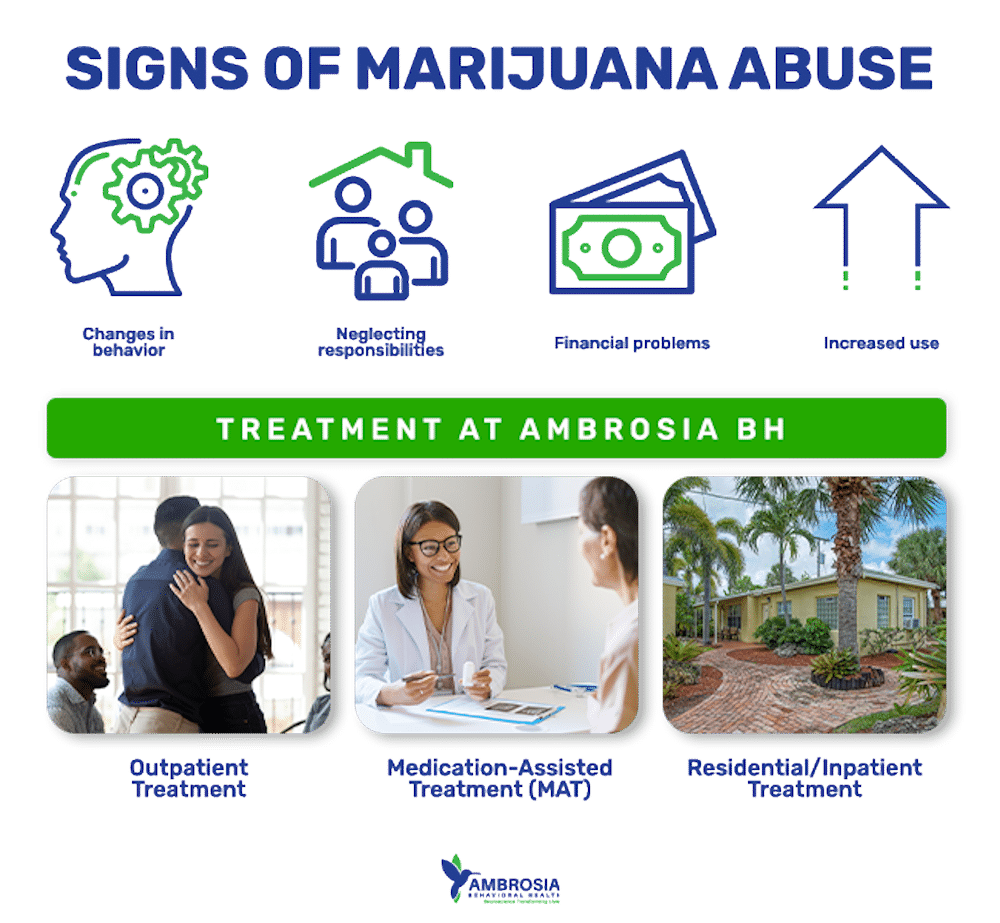Marijuana use has been a controversial topic for decades, with many advocating for its medicinal benefits while others denounce it as a harmful substance. However, for those struggling with marijuana addiction, finding the right treatment center is crucial for their path to recovery.
Our South Florida Behavioral Health Center can help you or a loved one overcome addiction. Don’t hesitate to get the help you deserve!

Marijuana comes from the cannabis plant that contains a psychoactive compound called tetrahydrocannabinol (THC). It is commonly used for recreational and medicinal purposes. The plant’s leaves, flowers, stems, and seeds can be consumed in various forms such as smoking, vaping, eating, or drinking.
Medical marijuana has been used for centuries for its therapeutic effects. It has been found to alleviate symptoms of certain medical conditions such as chronic pain, nausea, and vomiting caused by chemotherapy treatment, multiple sclerosis, and epilepsy.
However, marijuana also carries potential risks and side effects. High levels of THC from the cannabis plant can impair cognitive functions and may lead to addiction in some individuals. Long-term use has been linked to respiratory problems and mental health issues such as anxiety and depression.
If you or a loved one is experiencing symptoms of addiction, seek professional help from Ambrosia Addiction Treatment and Mental Health Programs.
How Common Is Marijuana Addiction and Abuse?
The National Institute on Drug Abuse (NIDA) defines addiction as a chronic, relapsing disorder characterized by compulsive drug seeking and use despite harmful consequences. According to this definition, marijuana addiction would mean that individuals continue to use marijuana despite facing negative consequences such as problems at work or school, relationship issues, or legal trouble.
Studies have shown that approximately 9% of people who use marijuana will become addicted to it. This number increases to about 17% for those who start using in their teenage years. While there is no consensus on whether marijuana can be considered addictive or abusive, it is clear that some individuals do develop problematic patterns of use and become addicted.


How Do People Become Addicted to Marijuana?
Some individuals may have a genetic predisposition towards developing a dependence on marijuana. This means that they may be more vulnerable to becoming addicted due to their brain chemistry.
Environmental factors, such as growing up in a household where family members use marijuana regularly or being exposed to peer pressure, can increase the likelihood of someone developing a dependence.
People with underlying mental health conditions, such as depression or anxiety, may turn to marijuana as a way of self-medicating. However, this can lead to a cycle of dependence. Learn about our rehab center for mental health in Florida.
Using marijuana at a young age increases the risk of developing a dependency later on in life. This is because the brain is still developing during adolescence and early exposure to drugs can alter its structure and function.
The widespread availability and accessibility of marijuana make it easier for people to develop a dependence. It is also often seen as a harmless substance, making it easier for individuals to justify continued use.
Marijuana Addiction Statistics
Furthermore, according to the Substance Abuse and Mental Health Services Administration (SAMHSA), in 2019, about 3.2 million Americans aged 12 or older had a marijuana use disorder in the past year. This accounts for approximately 1.2% of the population.
In addition to these statistics, it is also important to note that marijuana use can lead to other substance abuse problems such as opioid or alcohol abuse. The National Institute on Drug Abuse (NIDA) states that people who are addicted to marijuana are three times more likely to be addicted to heroin.

What Are the Side Effects of Marijuana Addiction?

- Physical Side Effects:
One of the most common side effects of marijuana use disorder is its impact on physical well-being. Regular use of the drug can lead to respiratory problems such as chronic coughing, bronchitis, and lung infections. It has also been linked to an increased risk of heart disease and stroke.
- Cognitive Impairment:
Marijuana affects the brain’s functions and can cause cognitive impairment in heavy users. This includes difficulties with memory, concentration, problem-solving skills, and decision-making abilities.
- Mental Health Issues:
Marijuana dependency can also lead to mental issues such as anxiety, depression, and even psychosis. These conditions can be exacerbated by regular substance use and may require treatment.
- Social Isolation:
Individuals who are addicted to marijuana may experience social isolation as they prioritize their drug use over maintaining relationships with friends and family.
- Financial Burden:
Marijuana dependency can also have financial consequences as individuals may spend a significant amount of money on purchasing the drug regularly.
- Legal Consequences:
Although laws around marijuana possession and use are changing in many countries, there are still legal consequences associated with being addicted to this drug. This includes fines, imprisonment, and a criminal record which could impact job opportunities in the future.
Seeking help from our South Florida detox center is crucial for those struggling with dependency to overcome its negative impact on their lives.

Signs of Marijuana Abuse
- Increased use: If a person is using marijuana more frequently or in larger amounts than before, it could be a sign of abuse.
- Neglecting responsibilities: Marijuana abusers may start to neglect their personal, work, or school responsibilities in favor of using the drug.
- Changes in behavior: People who abuse marijuana may exhibit changes in behavior such as mood swings, irritability, and difficulty concentrating.
- Physical symptoms: Red eyes, dry mouth, and increased appetite are common symptoms of marijuana use that can indicate abuse.
- Financial problems: A person who is struggling with marijuana abuse may also experience financial difficulties due to spending money on the drug.
- Relationship issues: Marijuana abuse can cause strain on relationships with friends and family due to changes in behavior and priorities.
- Legal issues: Possession and use of marijuana is illegal in many places, so getting caught with the drug can lead to legal consequences for someone who abuses it.

Marijuana Detox and Withdrawal Symptoms
Marijuana withdrawal symptoms can vary from person to person and can be influenced by factors such as frequency and amount of use, overall health, and individual body chemistry. Common marijuana withdrawal symptoms may include
- Irritability
- Anxiety
- Restlessness
- Insomnia
- Decreased appetite
- Physical discomfort
More severe marijuana withdrawal symptoms may occur, such as nausea, vomiting, headaches, sweating, tremors, and even seizures. These symptoms may require intensive care from our medication-assisted treatment (MAT) programs in Florida.
Treatment for Marijuana Addiction
In cases of severe addiction, seeking care at our medical detox center may be necessary to safely manage withdrawal symptoms. This involves gradually reducing the amount of marijuana in the body and providing medical support to alleviate any discomfort.
Our inpatient rehab in West Palm Beach, FL provides 24/7 care in a structured environment away from triggers and access to drugs. This type of treatment typically involves individual and group therapy, as well as activities aimed at promoting overall wellness.
MAT involves using addiction medicine, such as buprenorphine or naltrexone, alongside therapy to reduce cravings and manage withdrawal symptoms. This approach can be effective in treating dependency by addressing the underlying chemical imbalances in the brain.
Outpatient treatment offers flexibility for individuals who cannot attend residential treatment due to work or family commitments. It involves attending therapy sessions regularly while living at home. We also offer an intensive outpatient program for substance abuse at our rehab center.
Therapy is an essential component of any addiction treatment plan. Cognitive Behavioral Therapy (CBT), motivational enhancement therapy, and experiential therapy are commonly used techniques to help individuals identify triggers, develop coping skills, and modify problematic thoughts and behaviors related to drug use.

Continued Care Options for Marijuana Addiction Treatment

Sober Living
Sober living is another option for individuals seeking continued care after completing an addiction treatment program. Living in a sober living home can help individuals transition back into society while still receiving support and accountability from their peers. It also provides a drug-free living environment, which can be beneficial for those in the early stages of recovery.
Aftercare
Aftercare is an essential part of the recovery process for any addiction, including marijuana dependency. Aftercare typically involves ongoing therapy sessions with a counselor or therapist specializing in addiction treatment. These sessions can help individuals maintain their sobriety by addressing any underlying issues that may contribute to their addiction.
Continued care options such as sober living and aftercare are crucial in maintaining long-term recovery from marijuana dependency. Verify your health insurance to learn about affordable care options.

Our Marijuana Addiction Treatment Center Can Help You Recover
If you or a loved one is struggling with marijuana dependency, please don’t hesitate to reach out to us. Contact us today to learn more about how we can help you begin your journey towards recovery.

Dr. Alam is an internationally renowned psychiatrist with academic affiliations with Northwestern University and University of Illinois, Chicago where he completed his residency training. He has been a principal investigator for over forty studies and has been involved in research leading to the approval of most psychiatric medications currently on the market. He is the founder of the Neuroscience Research Institute which continues to conduct research on cutting edge medication and interventional psychiatry. Dr. Alam is a Distinguished Fellow of the American Psychiatric Association and the American Society of Addiction Medicine. He has won several awards and has been featured extensively on radio and television.










